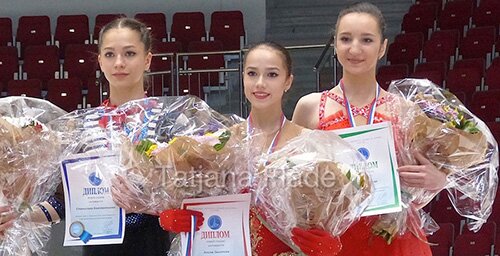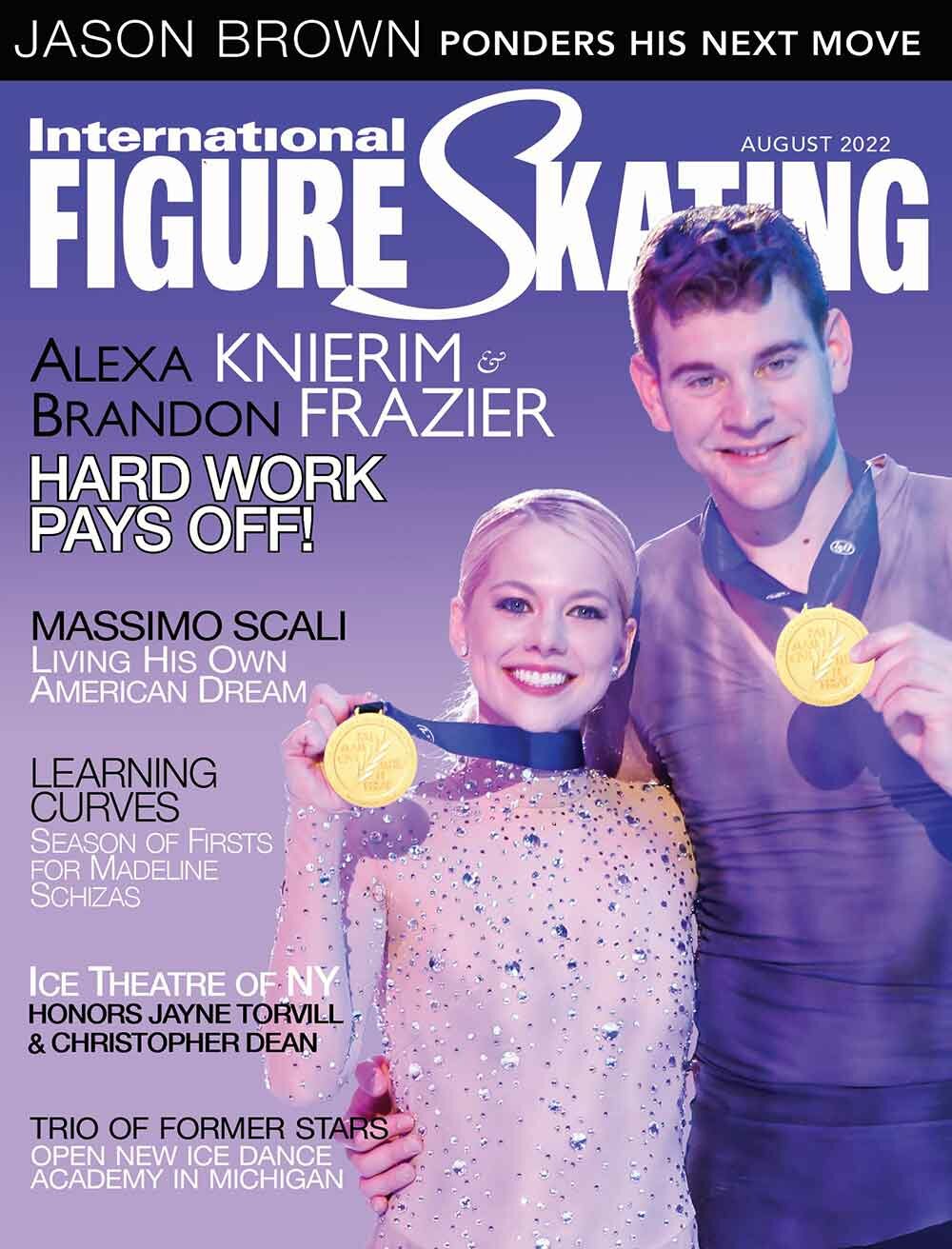

The 2017 Russian Junior National Championships took place in St. Petersburg last week. This competition revealed yet again, the incredible depth of talent in that country, especially in the ladies discipline. Alina Zagitova and Dmitri Aliev claimed top honours in the singles disciplines, and while there were also some very young and promising men and pairs teams that competed, the ice dance event proved not to be the strongest at these championships.
Zagitova Adds Another Gold to Collection
It has been a breakthrough season for 14-year-old Alina Zagitova. She followed up her success on the Junior Grand Prix circuit, with a win at the Junior Final and a second place finish at senior nationals last December. And in St. Petersburg, she was dominant once again.
Zagitova won the short with a solid performance that included a high-scoring triple Lutz-triple toe combination. Other than the landing of her first triple Lutz in the “Don Quixote” free program, which was not perfect, and to which she was not able to add the triple loop as planned, Zagitova effortlessly reeled off all every other jump. She executed a triple Lutz-triple loop combination late in the program as if it was the easiest thing in the world.
In total, Zagitova racked up 216.82 points, a score that would have had her in fifth place in the men’s event (and the men have only one more jumping pass plus a higher component score factor). “I was more nervous than at senior nationals, because here is the qualification for Junior Worlds,” Zagitova admitted. “What I learned here is that you need to stay focused and cannot lose your concentration.”
Though Zagitova’s victory came as no surprise, it was exciting to see a relatively new face emerge in the form of 16-year-old Stanislava Konstantinova from St. Petersburg, who was actually the oldest skater (born in July 2000) out of the 18 ladies that competed. The next oldest was Polina Tsurskaya, who was born in July 2001, while the remaining skaters were born in 2002, 2003 and 2004.
Konstantinova did well this season by placing second and fourth at her Grand Prix assignments and sixth at senior nationals. She made two little mistakes in St. Petersburg. In the short program she stumbled during the footwork, and in the free she popped a flip into a double.
“I am not happy about that, but overall I am pleased with what I did,” she said. “There was no reason for the mistake. You just need to believe in yourself in order to be successful. All the girls here are at a very high level, and whoever is psychologically the strongest will be the leader.”
Tsurskaya struggled with injury this season and had to withdraw from the Junior Final and senior nationals. She looked great in practice, but nerves got to her in the short and she failed to execute a combination. The free went well, except for one double flip. Her programs are expressive and her powerful skating does not reflect that of a junior skater.
By the time Junior Worlds comes around she should be in top shape and ready to challenge Zagitova, with whom she trains under Eteri Tutberidze and her team in Moscow. “I doubted myself and I shouldn’t have done that,” Tsurskaya said of her mistakes.
Behind the top three that will go to Junior Worlds, there is an armada of younger and equally talented girls: Alexandra Trusova, 12 and Daria Panenkova, 14, who are coached by Tutberidze and her team; Alisa Fedichkina, 14, who works with Evgeni Rukavitsin; Anastasia Gubanova, 14, who is coached by Angelina Turenko; and Anastasia Guliakova, 14, who trains under Ilia Klimkin. These young ladies ranked fourth to eighth and all do triple-triple combinations with ease.
Not all of them skated perfectly, but they all have potential, as do the lower ranked ladies. In Russia, you need to be at a high standard technically to even qualify for junior nationals.
Fedichkina needs to fix some under-rotation problems and the balletic Gubanova needs to become more consistent. Panenkova is very athletic but could be more elegant. Guliakova is working on the triple Axel and tried it in practice. Anna Tarusina, who suffered severe injuries in the car accident at the Junior Grand Prix in Courchevel, France in 2016, finished a respectable 10th with two strong performances, hitting all her triples. She was back on the ice at the end of October, but this was her first major competition of the season.
Not all these ladies will make it to the top, but each of them has potential and Russia for now does not have to worry about this discipline. Zagitova will head into the World Junior Championships as the one to beat.
Winning Streak Continues for Aliev
The men have been the “problem children” for Russian figure skating officials, but these nationals showed that new talent is rising up the ranks.
Dmitri Aliev, the reigning Junior Grand Prix Final champion, is developing into an elegant, expressive skater — one who also has the hardware. The 17-year-old continued his successful season in St. Petersburg, defending the title he won last year.
The short was strong, other than a wobble on the triple Lutz-triple toe. A solid quad toe and two triple Axels highlighted the free skate, but he doubled two jumps in the middle of the program. “I am glad to end the competition on a high note,” Aliev said. “It was not easy, though. I don’t know why I made those mistakes in the second half — I felt good in the program. I need to find out what happened.”
For some it came as a surprise that Alexander Petrov competed at the junior level, and was aiming for a spot at World Juniors. He accomplished his goal, finishing in second place. “I had not much choice, really. Sometimes you need to take a step back to take a step forward — at least I hope I will do that,” explained the 17-year-old who has not found success on the senior stages to date.
Petrov finished sixth at senior nationals and was not selected for Europeans or Worlds. He was ineligible for the Winter Universiade as he is not enrolled in university yet. Petrov went for a quad toe in the free, but fell and the jump was downgraded.
Igor Efimchuk unexpectedly claimed the bronze medal, which he earned with solid performances — although he had a bad fall on the quad toe in the free. Like the top two men, he comes from St. Petersburg. For Efimchuk, who trains with Julia Kulibanova, this was his biggest success to date and he is now a substitute for Junior Worlds. The third spot on the team will go to Alexander Samarin, who was second at both the Junior Final and senior nationals and finished seventh at the 2017 European Championships.
Makar Ignatov, 16, who placed fourth, is another promising young skater from Rukavitsin’s group in St. Petersburg, and who has jumps up to the triple Axel. Muscovites Alexei Erokhov, who was fifth, Artem Frolov, sixth, and Ilia Skirda, seventh, also showed potential. Roman Savosin, the bronze medalist last year and a 2016 Junior Grand Prix finalist, had a disappointing outing and faded to eighth overall.
Then there is a group of youngsters born between 2002 and 2005 that also show good potential: Petr Gummenik (ninth), tried a triple Axel but missed it; Egor Rukhin (11th), Matvei Vetlugin (13th), Andrei Kutovoi (15th) and Mark Kondratiuk (16th) not only have solid jumps, but also strong skating and presentation skills. Kutovoi especially stands out — he is a great performer at just 11 years of age. It will be interesting to see how all these boys develop.
New Kids on the Block Claim Pairs Title
Alexandra Boikova, 15 and Dmitri Kozlovskii, 17, are quite a new pair, having skated together for just a little over a year, and who have progressed with each competition. The young team from St. Petersburg trains in Tamara Moskvina’s group under the guidance of Artur Minchuk, a former pairs skater who competed at the international junior level for Russia.
Boikova and Kozlovskii ranked second in the short after she stumbled on the throw triple flip, but they turned in an excellent long program that included triple jumps and throws without any major errors. The Junior Grand Prix Final bronze medalists scored 181.58 points. “We are overwhelmed by emotions. When we started the season, we obviously set the maximum goals for ourselves, but it was hard to believe that we would be Russian junior champions in February,” Kozlovskii explained.
Amina Atakhanova and Ilia Spiridonov have more experience, but they lack consistency. The Muscovites led after a clean, dynamic short program, but Atakhanova missed the triple Salchow and throw triple flip, and the double Axel was under-rotated. As a result, the students of Natalia Pavlova slipped to second with 176.17 points. “We are 50 percent satisfied. There were two falls and we wanted to skate better than that,” Atakhanova said. “Hopefully we’ll be in top shape for Junior Worlds. Atakhanova struggled with injuries last season and the team was unable to compete at the World Junior Championships in 2016.
Bronze medalists Alina Ustimkina and Nikita Volodin are another promising young team from St. Petersburg. They especially shone in the long program with the only major error coming on a botched death spiral. “We want to work on our elements and get higher levels, especially on the death spiral,” Volodin said.
The technically solid Elizaveta Zhuk and Egor Britkov from Ekaterinburg managed to break into the phalanx of the teams from Moscow and St. Petersburg by placing fourth. Daria Pavliuchenko and Denis Khodykin from Moscow and St. Petersburg’s Daria Kvartalova and Alexei Sviachenko also show potential.
Anastasia Mishina and Vladislav Mirzoev, the Junior Grand Prix Final champions who looked to be the new leaders in the Russian junior ranks, did not compete. It is reported that he is recovering from a knee injury, but it is all over town that they are splitting up and want to continue with new partners.
Shpilevaya and Smirnov Surprise in Ice Dance
It was perhaps the upset of the competition when Anastasia Shpilevaya and Grigorii Smirnov beat the favorites Alla Loboda and Pavel Drozd to claim the ice dance title. Loboda and Drozd won the short dance with an excellent performance, but Shpilevaya and Smirnov were not far behind.
Shpilevaya and Smirnov, who train with Irina Zhuk and Alexander Svinin, turned in a lively free dance, albeit to a slightly old-fashioned Italian medley. The program was well received, nonetheless. The Muscovites made no mistakes and earned high levels and danced to gold with 163.88 points. “We did everything we can do and we are very pleased,” Smirnov said. “To be honest, we didn’t really expect to win this competition. After the short dance we understood that we can compete with everybody if we skate clean and today we skated really clean.”
Disaster struck Loboda and Drozd in the free dance. She stumbled first in the circular footwork and then fell during the diagonal step sequence in their “Malagueña” program. “The step sequences are the most costly elements. If you make mistakes there, you lose a lot of points,” a rueful Drozd explained.
“Our preparation was a bit forced — we both were sick — so maybe I was nervous because of that,” Loboda added. The 2016 Junior Grand Prix Final silver medalists scored 157.99 points.
The bronze medal went to Anastasia Skoptcova and Kirill Aleshin from Elena Kustarova’s group. They put down two solid performances to grab a spot on the World Junior team. “Our goal for Junior Worlds is to present ourselves and to represent our country and our federation well. We want to improve in every aspect,” said Skoptcova.
Sofia Polishchuk and Alexander Vakhnov, who danced into fourth, are another promising couple as are Ksenia Konkova and Grigori Iakushev (5th) and Sofia Shevchenko and Igor Eremenko (6th). Arina Ushakova and Maksim Nekrasov (7th) especially shone in the short dance.




